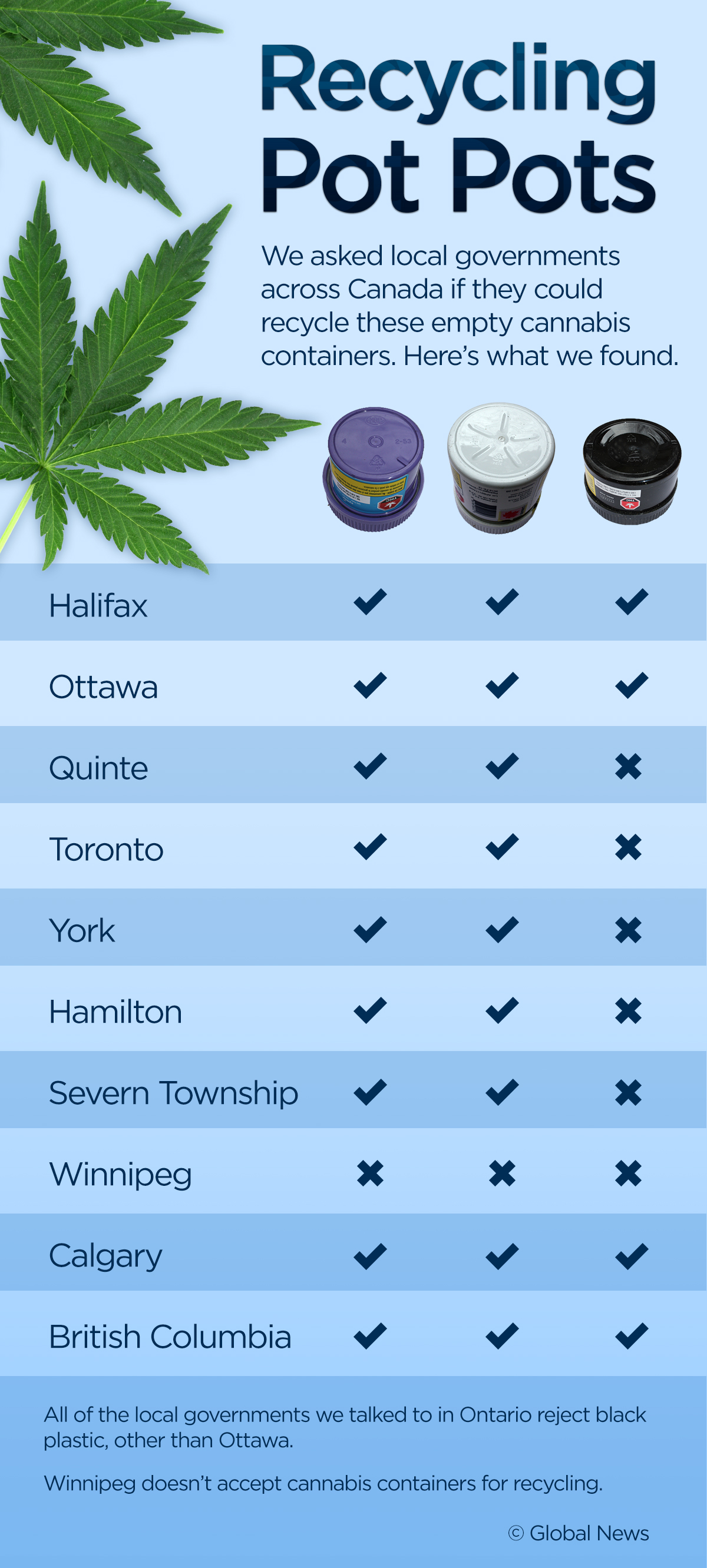The cannabis growers who had to design cannabis containers faced a long, rigid set of federal rules, and not much time to figure out how to comply with them.

The containers have to have a matte finish, opaque or translucent and be child-resistant (and there are a whole separate set of rules for what that means). The rules go so far as to forbid certain kinds of ink.
“The packaging is very regulated,” says Hilary Black, chief advocacy officer at Canopy Growth.
“It has to be childproof. It has to be smellproof. It has to be waterproof, and it has to be food-grade. To meet all of those requirements, we ended up with multi-materials in the packaging, and that’s the thing that makes it difficult to recycle because it requires manual separation. Our municipal recycling programs and facilities are not able to handle that.”
Many local governments Global News contacted disagreed, saying they could recycle empty plastic cannabis containers if residents put them in the blue bin. (In Ontario, most municipalities we talked to said they couldn’t deal with black plastic, but other colours were fine.)
However, Black says, they are wrong.
“From the photos, those recycling facilities may not understand that there are layers of material in there, and they’re just looking at the black plastic. There’s a layer of tin inside as well.”

Many Canadian cannabis producers, including Redecan, 7Acres, Canopy and Aurora, use black plastic containers, though producers are allowed to use any colour they want.
“My understanding is that the multi-material issue is actually the problem, rather than the colour,” Black says.

Get breaking National news
“Even if it wasn’t black, it still wouldn’t be able to be recycled at municipal recycling stations. Because they are composed of several materials, it would require manual separation, and that’s just too complicated a process, and just isn’t available at most municipal recycling facilities.”
The reason black is an issue is simple.
“It’s because the optical sorters here that sort plastic with sensor opticals can’t differentiate black plastic from the conveyor belt,” explains Jo-Anne St. Godard, executive director of the Recycling Council of Ontario.

To deal with the issue, Canopy has developed an elaborate workaround, putting cannabis container recycling bins in retail cannabis stores in most provinces, and offering free UPS labels to consumers who are far from a store to send their containers for recycling. The recycling bins are in over 100 cannabis stores in the Prairies and Atlantic Canada.
“In the places where we do have retail set up, we’re trying to emulate the beer store model where you bring your empties in and then you take away your bottles that are full of beer,” Black explains.
The recycling company that Canopy uses is ready to deal with the specific issues that pot pots pose.
“It’s really great to have a consumer take-back program,” St. Godard says. “That’s progressive. It’s important, and I’m sure consumers will respond to that.”
On the other hand, she argues that containers could have been designed that were simpler to recycle.
“Everybody was racing to market, they were having a hard time supplying, as I understand it. Under those conditions, producers often don’t think about, or consult with recyclers. They are not considering that when they choose a package. I’m sure that’s what happened here.”

They can’t simply be cleaned out and reused, Black says.
“It’s not because we can’t do it from a regulatory perspective, but actually because of sustainability issues. The way that they’d be required to be sterilized would require a ton of energy and a huge amount of water.”
The regulations don’t actually specify that containers have to be plastic. There are a couple of other possibilities, each with their tradeoffs.
“Metal is generally infinitely recyclable,” St. Godard says. “It’s safe, it can be lightweight – look at the beer industry. Quite a bit of beer now is sold in aluminum cans. You can recycle an aluminum can 90 or 100 times.”
Glass is also a possibility, though one that comes with flaws.
“When you think about glass, it’s heavier to transport. It takes more fuel to take a container of glass materials versus plastic. Plastic’s attributes are that it’s quite light, it’s cheaper to truck them around and doesn’t take as much energy. Glass is breakable so if you’re travelling long distances, it breaks, and then you’ve got contamination issues.”

(The rules around childproofing only apply until the consumer actually gets the package, though up until then it has been in places that children are strictly excluded from. The Ontario Cannabis Store suggests keeping dry flower in glass Mason jars at home to keep it fresh.)
The federal packaging rules specify many things, but making sure containers can be easily recycled isn’t one of them. For St. Godard, that’s part of the problem:
“I really wish that in the regulations, the federal government would have thought about recyclability of the package. Why not add that as a requirement right at the onset?”
“Then you would have forced these packagers to take the time to better understand how the package behaved, and saved us retroactively going back to try to fix a problem that has irritated consumers, and is a bit of a quandary for cannabis producers, who are just trying to do their job and get a product to market.”







Comments
Want to discuss? Please read our Commenting Policy first.